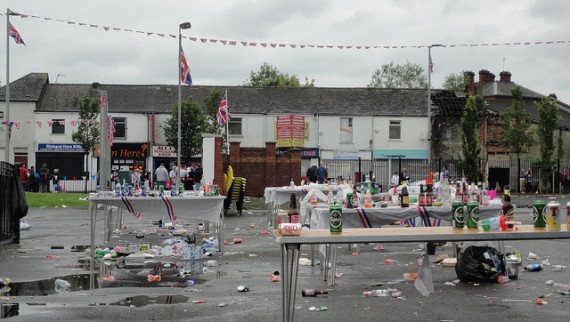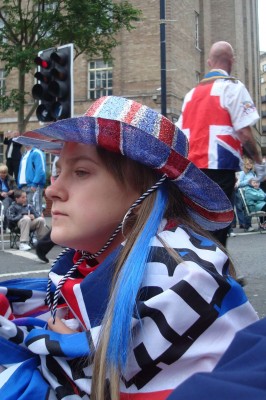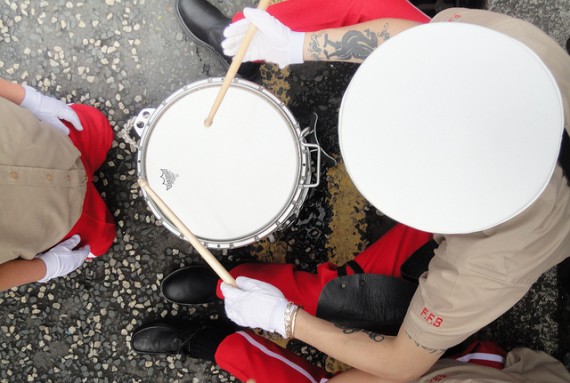The BBC’s live coverage of The Twelfth of July parade through Belfast city centre becomes more anachronistic with every passing year. Last year, a complaint was made to the BBC and later in the post I’ll refer to the finding.
While the capital city’s parade remains the longest across Northern Ireland (Armagh is the largest), the numbers of Orangemen and women marching in each lodge is thinning out, often marching two abreast where once eight would have walked, and nowadays with more bandsmen than Orangemen. There’s a sameness to the bands that are hired by the lodges: Blood and Thunder and accordion bands can hack the long distances that don’t suit the pipers who normally appear in shorter rural parades.
Year after year, commentary from Walter Love picks out the history behind some of the banners being carried, and street interviews by Helen Mark catch the mood of those on the streets.
I expect that this July’s commentary is unlikely to go into a lot of detail about the incident outside St Patrick’s church whenever the Young Conway Volunteers pass by the broadcaster’s cameras in Bedford Street.
I recall one kerbside interview four years ago with a Antipodean ‘tourist’ that ended abruptly when the woman (who I know) didn’t talk about the colour and the pageantry but instead questioned the appropriateness of the parade in modern-day Northern Ireland. The expected tone of the programme seemed to have been breached and the pictures cut back to the lodges marching past.
Later on in the evening of 12 July, both UTV and BBC will broadcast a programme of highlights from each major parade and the speeches in the field. The report from the Belfast field won’t show anyone drinking or the toy guns (if they’re still on sale). Instead there will be upbeat and uncritical summaries of the most wholesale aspects: ice cream cones, sheltering from the rain, and dogs. (A few years ago every report from a field in the UTV programme featured a dog – there must have been some kind of bet amongst reporters. Worth noting that this year UTV broadcast a St Patrick’s Day programme highlighting many of the different parades around NI.)
What bothers me most about the coverage of the Twelfth is not that several hours of television is devoted to a shrinking minority of men and women marching. Nor am I overly annoyed that a parade from the “other side” doesn’t get equal prominence. I wouldn’t want to start a space race of parades.
It’s the lack of critical analysis and context that bugs me.
There are few comparisons between the tone and mood of urban and rural parades. I’ve never heard discussion about the differing levels of participation in the religious services held at the fields. (My experience at the Belfast field in 2008 was that there were more independent observers listening to the speeches than members of Orange lodges.)
 There are no references to the clouds of acrid smoke and street parties the night before and the nationalist election posters and effigies of the Pope burnt on Eleventh Night bonfires. (The Orange Order will be swift to distance their organisation from the construction and lighting of bonfires, but they’re part and parcel of the same Orangefest season.)
There are no references to the clouds of acrid smoke and street parties the night before and the nationalist election posters and effigies of the Pope burnt on Eleventh Night bonfires. (The Orange Order will be swift to distance their organisation from the construction and lighting of bonfires, but they’re part and parcel of the same Orangefest season.)
There are no cameras outside flash points – like the back of St Matthew’s church on the Newtownards Road – to catch Parades Commission determinations being breached, perhaps as bands launch into The Sash.
In recent years footage from one other parade has been cut into the live coverage. But why does the Belfast parade need to be highlighted every year? Why not base the entire production from another venue?
I’m always amazed that there is so little discussion – either in the live or highlight programmes or in news bulletins or documentaries in the days beforehand – of the historical events leading up to 1690 and the origin of the signs and symbols, events and celebrations that surround the Orange Order, its sister institutions and the loyalist culture.
No one will explain that the Twelfth would have been commemorated on the first of July (Battle of Boyne = 1 July 1690 Julian calendar) if it hadn’t been for the British adoption of Pope Gregory’s shifting of the calendar in 1752. And no one will point out that despite the words of The Sash, it wasn’t worn at Aughrim or the Boyne, as the Orange Order didn’t exist until 1795.
 Alison Millar’s series of documentaries looking at women’s lodges and a loyalist band are the only examples of wider context I can remember seeing.
Alison Millar’s series of documentaries looking at women’s lodges and a loyalist band are the only examples of wider context I can remember seeing.
The richness and history of the parade and associated events – mundane and controversial – are reduced to moving images of the same city centre parade, from the same vantage point, geographically, culturally, historically and politically.
In a News Letter article from July 2011, one-time BBC Twelfth commentator Clifford Smyth explained:
“The Orange isn’t well understood, it is an inarticulate organisation which doesn’t explain itself well to the world …”
He said he had told the BBC that “some kind of new format was needed” for its coverage, by going to some of the parades outside Belfast. “There are a lot of problems with the Belfast parade. It is exceptionally unrepresentative of Orange parades.
“It’s unique and very different from the experience that you’re going to get in somewhere like Comber, both in terms of the quality of the bands – I’m not decrying the bands but there is a sameness about the bands in Belfast which you don’t get in these country areas – and I personally think that the length of that parade in Belfast is, if it’s not actually killing the Orangemen, it’s killing Orangeism in Belfast.”
Sammy McNally has guest posted on BangorDub blog on the subject of a complaint about last year’s The Twelfth live coverage that wound its way up through BBC NI, the BBC executive and London and finally ended up with a determination from the BBC Trust’s Editorial Standards Committee (ESC). [Note that the BBC Trust is the operationally independent body that governs the BBC. Disclosure – I spent five years as a member of the local Audience Council advising the BBC Trustee for Northern Ireland on behalf of NI licence fee payers.]
The complainant wrote to BBC Complaints on 15 July 2012 saying that he and probably the vast majority of the public on the British mainland would be appalled at the “uncritical promotional coverage such as provided by BBC Northern Ireland in programmes like ‘The Twelfth’.”
He argued that the programme normalised sectarianism in a society in which probably more than 42% of the population believes the Orange Order contributes very negatively to community relations.
The ESC report discusses the complaint, executive responses, whether the parade was controversial or highly controversial, and how the programme matched up to editorial guidelines over eleven pages and concludes that “The Twelfth programme had complied with the editorial guidelines on impartiality”. The complaint was not upheld.
They’re probably right that the 12 July 2012 live coverage did comply with the guidelines. (In particular, the notorious Famine Song incident occurred outside the live broadcast and was covered in news and current affairs programmes over many days and weeks. That said, there were – and are – many more controversial aspects to the Twelfth celebrations.]
Sammy makes the point:
It is difficult not to believe that the Trust might have taken a somewhat different line if a parade in London – which was viewed as sectarian/racist by about half the citizens of the city, required the presence of hundreds of riot police, which led to a serious deterioration in community and political relations over the following months because of a sectarian/racist incident, which went through areas where it was not welcome and where the parade organisers had been ambivalent about upholding the law – had been given similar promotional treatment by BBC London.
Other than the marathon or a royal wedding/state funeral, it is inconceivable that BBC London or BBC News channel would cover any march through the city without a modicum of balance and analysis. Even Margaret Thatcher’s funeral required input from her critics.
At one point in the ESC report there is reference to 2013 coverage:
… the Head of Entertainment and Events for BBC Northern Ireland had assured the ECU [Editorial Complaints Unit – the BBC executive complaints department not the BBC Trust’s ESC] that the manner in which BBC NI covered the event is constantly the subject of close scrutiny and review; detailed discussion was taking place at a senior level about the nature of the coverage in 2013.
While the programme didn’t break impartiality guidelines, I’d hope that the internal discussions around the complaint will have sparked some debate about how to appropriately cover the Twelfth.
 Just because it has been covered for fifty years shouldn’t mean that the coverage should continue in such a predictable manner. The high cost of staging an outside broadcast (even one right outside the BBC building’s front door) that involves bringing in a tall camera platform needs to be weighed up against the public value and distinctiveness of the programming.
Just because it has been covered for fifty years shouldn’t mean that the coverage should continue in such a predictable manner. The high cost of staging an outside broadcast (even one right outside the BBC building’s front door) that involves bringing in a tall camera platform needs to be weighed up against the public value and distinctiveness of the programming.
It would have been unthinkable for the four hour 2012 Covenant march to Stormont to have been televised live … even though it was a larger parade and could arguably have been placed in a historical context.
Just because the deletion of The Twelfth from the BBC NI schedules might risk sparking an outbreak of disturbance directed against the BBC doesn’t mean that the decision couldn’t be sensitively considered and discussed with stakeholders.
The Belfast parade could be ditched for another venue. The UK’s 2013 City of Culture is staging one of the Grand Lodge’s ‘flagship’ parades this year.
The City of Londonderry plays host to the annual Battle of the Boyne commemoration demonstration. Awarded ‘Flagship Status’ by The Grand Lodge of Ireland, the day will be one to remember as bands and lodges from across the city and county travel to Londonderry. To mark this occasion and the UK City of Culture year, this year the parade will be led by the Grand Masters of Ireland, England and Scotland.
Perhaps more importantly than the venue, outside of news bulletins surely more emphasis should be given to setting the history of the Twelfth narrative in a context that can be accessed by all BBC NI licence fee payers.
Given that the Irish history taught in schools [at least in my day] tends to miss out the parts relevant to understanding our culture, the BBC should take a lead and better fulfil two of its purpose remits: namely sustaining citizenship and civil society, and promoting education and learning.
Update – The issue was unexpectedly picked up by The Independent on 11 July.
Alan Meban. Tweets as @alaninbelfast. Blogs about cinema and theatre over at Alan in Belfast. A freelancer who writes about, reports from, live-tweets and live-streams civic, academic and political events and conferences. He delivers social media training/coaching; produces podcasts and radio programmes; is a FactCheckNI director; a member of Ofcom’s Advisory Committee for Northern Ireland; and a member of the Corrymeela Community.
Discover more from Slugger O'Toole
Subscribe to get the latest posts to your email.

